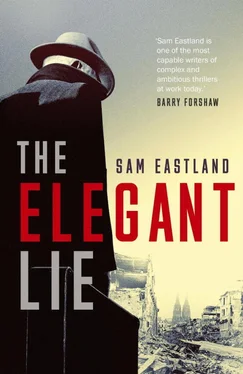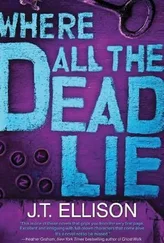Although he had no trouble identifying every sound, they seemed so distant in his memory that it was almost as if they had been borrowed from someone else’s recollections. They had been overlaid by the sounds of the Langsdorf◦– the jangle of keys, the slamming of metal doors, the rustle of water in pipes. But more than anything else, it was the silence of the prison that had settled like a suffocating weight upon his chest, stifling the voices of the convicts, who never raised their voices without punishment. Out here in the world, the silence existed only in between the noises that made things normal. But in the jail, it was the silence that ruled over everything else, so that the noises became little more than punctuation in the terrible language of stillness.
Carter heard the floorboards creak outside his room. And then he heard them stop. He sat upright, no longer drowsy from the wandering of his thoughts.
There was a sharp knock on the door.
He waited, thinking maybe they would go away.
But the knocking came again.
‘Who is it?’ he asked.
‘Room service!’ was the muffled reply.
Carter slipped off the bed and went to the door. He opened it slightly, keeping the guard chain on and standing to one side, knowing that if someone tried to kick the door in, the chain would be of little help in stopping them. A man stood with a tray balanced on one hand. He was wearing a short, white jacket and a pillbox hat. The contents of the tray were covered with a silver metal dome, which also obscured his face.
‘I didn’t order any room service,’ said Carter.
‘Oh yes you damned well did,’ said the man and, as he spoke, he shifted the tray so that Carter could see his face.
He was clean-shaven and sallow-looking, with thinning brown hair which was turning grey around the temples. Carter immediately recognised his control officer, Marcus Wilby.
‘Hold on a second,’ said Carter. He closed the door for a moment, undid the guard chain and then opened the door again, swinging it wide so that the man could pass through.
As soon as the door was shut again, Wilby thumped the tray down on a desk by the window, whipped off the pillbox cap and tossed it away into a corner of the room. ‘Damn,’ he muttered. ‘I bet I get fleas from that thing!’
‘Hello, Captain,’ said Carter.
‘It’s Major now,’ he replied, unbuttoning the white coat, ‘and I heard Dasch offered you a job.’
‘He did.’
Wilby paused. ‘What kind of a job?’
‘He wants me to use my contacts at the American military bases, so that he can start buying stolen goods from them directly. Except I don’t have any contacts.’
‘Don’t worry about that,’ said Wilby. ‘We can take care of it. Just tell him you can get whatever he wants, then stall him for a couple of days. It might take me a while to set things up.’
‘And if I need to reach you?’
‘Use the standard protocols, the same as you’d have done with Eckberg.’ Wilby flopped down into a wing-backed chair by the window, subsiding into the upholstery as if his bones were dissolving inside him.
‘Why did you pull him?’
‘Security concerns,’ replied Wilby. ‘Nothing you need to worry about.’
‘Why don’t you tell me what’s going on and let me decide if I need to worry or not?’
Wilby paused. ‘All right,’ he said. ‘A few days ago, we lost somebody who worked at the embassy in Bonn.’
‘An agent?’
‘Not exactly,’ said Wilby, ‘but I did have her working on some agency business, and I think that might have got her killed.’
‘So who was she? What was she doing?’
‘I got to know her when I was stationed in Berlin, right after the end of the war. All of us who worked for the CIA, or Strategic Services, as it was known back then, were quartered at what they called the Joe House on Promenadenstrasse. It was like a cross between a country club and a boarding school, and for all I know it may have been one of those things before we took it over. It was one of the only places in the city where you could get a decent meal and sleep in clean sheets. We were all lumped in there together, trying to figure out how to deal with the Russians, who were way ahead of us in almost every aspect of intelligence gathering. We knew that Soviet agents had penetrated British intelligence and that these agents had recruited people who were already working at MI5 and MI6. It became so bad that we hesitated to share information with the British, knowing it would be funnelled directly to the Russians. As a countermeasure to this happening in our own offices, we began placing agents in low-level but important positions at various stations around Europe. These agents had instructions to let slip comments which might make any potential recruiter for the Soviets believe that they had found a suitable candidate.’
‘What kind of comments?’ asked Carter.
‘Just little things,’ replied Wilby. ‘A mention here or there expressing admiration for the Russians. Music. Writers. Food. Nothing too obvious.’
‘But if you place an agent whose job is to catch Russian spies, how do you make sure that the spy isn’t told about the operation?’
‘Exactly,’ answered Wilby. ‘And the answer is, you don’t tell them. You don’t tell anyone at all. I put her in play at the Bonn station two months ago. I gave her a bottom-rung job as an archivist at the embassy. She wasn’t even directly attached to the CIA branch.’
‘And what happened?’
‘Nothing, at first,’ replied Wilby, ‘but about two weeks ago, she informed me that she had been approached by someone she thought might be trying to recruit her.’
‘And you knew this person?’
‘No, and neither did she. It came in the form of a letter, which somebody left on her desk. It said it was from someone who shared her views and who wanted to meet to discuss them.’
‘What did you do?’
‘I told her to go to the meeting,’ said Wilby. ‘It was due to take place in the Poll district, just across the river from here. I was going to be there to make sure everything went smoothly. Then, at the last minute, her contact moved the time up. She left me a message but, by the time I received it, it was too late. When I got there, she had already been and gone.’
‘Was she able to identify the person?’ asked Carter.
‘You don’t understand,’ said Wilby. ‘She washed up in the reeds two days later.’
‘I just read about that in the paper,’ said Carter. ‘They said it was a suicide.’
‘I’ll be damned if it was,’ replied Wilby, ‘although I can’t prove it, of course.’
‘So what you’re telling me,’ he said, ‘is that Bonn station has been compromised?’
Wilby sat forward and touched his fingertips together. ‘I don’t know. Maybe. It might be nothing. Maybe she did kill herself.’
‘You just said—’
‘I said I don’t know!’ Wilby raised his voice.
‘But you think Eckberg might be leaking information?’
‘Not deliberately. Not him. But he’s not ready for this. You could see that for yourself. The problem is, they’re sending us people straight out of college who don’t have any real world experience, let alone field craft. To them, the whole world is a Norman Rockwell painting. If there is someone working for the Russians at Bonn station, Eckberg is exactly the kind of person they’ll go after. That’s why I took him out of the loop◦– I stopped any problems before they could start.’
‘Who else knows about me?’ asked Carter.
‘Aside from Eckberg, just the station chief, Colonel Babcock. And now that Eckberg is out of the picture, it’s just Babcock and me. I’m keeping everything as tight as possible for now. The fewer links between you and me, the less chance there is of compromise. Surely you can see the sense in that.’
Читать дальше











